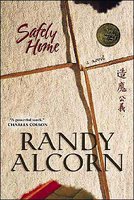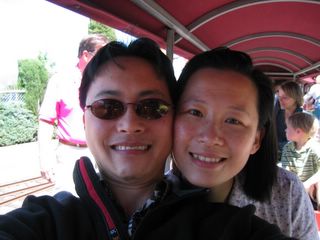Book Review: Safely Home
 I don't often read fiction; much less "Christian" fiction (which I find in general to be less than sound theologically and often sentimental rather than substantive). But I found out from Jacob Hantla's blog about Randy Alcorn's novel Safely Home and it piqued my interest. Last night, a day after getting it, I read the book through in one sitting (about 4 hours). After doing so, I have to agree with his opinion on the book: "... this book stirred up in us both a passion to share the Gospel, instilled a greater love for God, and humbled us greatly..."
I don't often read fiction; much less "Christian" fiction (which I find in general to be less than sound theologically and often sentimental rather than substantive). But I found out from Jacob Hantla's blog about Randy Alcorn's novel Safely Home and it piqued my interest. Last night, a day after getting it, I read the book through in one sitting (about 4 hours). After doing so, I have to agree with his opinion on the book: "... this book stirred up in us both a passion to share the Gospel, instilled a greater love for God, and humbled us greatly..."The novel basically sets itself in modern-day China with an emphasis on the state of the church in China. Its emphasis is on the Christian persecution and moral decay of China in the context of a humble Chinese Christian named Li Quan. The other main character, Ben Fielding, is basically a backslidden Christian who has chosen to forsake any ties to his faith (and family, having divorced his wife) for the sake of business success and prosperity. The story tells how he goes to China for business and meets up with his former college roommate Li Quan, in whose life he was actually instrumental for bringing to Christ. Ben discovers, to his surprise, that Li Quan is not the professor or author he assumed him to be, but a lowly assistant locksmith. What's more -- and this is the heart of the story -- while Ben has abandoned his faith, Li Quan's faith has only been strengthened in the face of suffering as a member of the house church movement. The rest of the story follows the two as they both discover why the Lord has brought them together at a pivotal moment in both of their lives.
As a Christian of Chinese heritage, I especially enjoyed this book for its frankness in revealing many of the challenges facing the underground Christian church in China -- from persecution by government authorities to heresy and false teaching from within. I also appreciated the bold faith with which Alcorn endows characters, no doubt gleaned from source material of actual Chinese Christians of our day and age. The book, unlike much fiction, was not an escape from real life; but in many ways, a healthy reminder of the genuine suffering and persecution and providence in the lives of many believers in countries outside of the United States. There is also much Scripture, quoted verbatim, that keeps the book very Biblical in its underlying message.
This was a book that I'd recommend not so much because its Christian fiction, but because it presents the history (and present day situation) of the Chinese church as well as solid Christian truth in a fictional setting that allows for engaging presentation. Again, no doubt, the book was in many ways a composite of testimonies and stories that Alcorn gathered in research of the text.
One weakness of the book for the average English-speaking reader is that Alcorn freely uses pinyin (Chinese phonetics) for common Christian terms in Chinese without translation. While these can be deduced from context most of the time, someone who doesn't speak Mandarin may have trouble keeping up with references to "Zhu Yesu Jidu" (Lord Jesus Christ) and the like. On the other hand, since I am somewhat familiar with "church Chinese" these sprinklings of Chinese actually made me connect with the story just a bit more.



